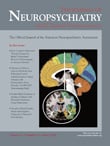Insomnia and Suicide Risk
To the Editor: Risk factors for suicide vary according to age, gender, ethnicity, psychiatric diagnosis, family history of suicide, and prior suicide attempt. 1 , 2 Increasing evidence suggests that sleep disturbances, particularly insomnia, are associated with increased risk for suicide. 3
Clinical studies have shown that suicidal ideation during depression is frequent in patients with insomnia compared to depressed patients without insomnia. 4 Furthermore, patients with depression and insomnia score high on the Beck Scale for Suicidal Ideation compared with depressed patients without insomnia. 4
Therefore, the importance of the clinical evaluation of sleep disturbances, particularly insomnia, in patients with depression is due to the relationship between depression, suicidal attempt, and insomnia.
Moreover, depression, suicide, and insomnia may share the same neurobiological mechanism. 4 , 5 Clinical studies prove the association between depression and low serotonin levels in the brain. 5 Postmortem studies have found lower serotonin levels in the brainstems of suicide victims. 5 It is documented that serotonin facilitates the onset of sleep and maintains slow wave sleep. 4 – 6 Thus, dysfunction of serotonergic system is associated with disturbed sleep-wake cycle. 4 , 5 Accordingly, the role of serotonin could be a responsible mechanism for the association between depression, suicide, and insomnia. 4 – 6
This article reports two patients who presented with first suicidal attempt in the context of insomnia, which led to their first psychiatric admission. They related their suicide attempts to sleep problems that impaired their quality of life. They were treated with sedating antidepressant medications that improved sleep efficiency.
Case Reports
The first case is a 66-year-old man with depression who was treated with escitalopram, 20 mg/day, for 3 years. He complained of having difficulties falling asleep and maintaining sleep for a few weeks that made him wander on the streets in the middle of the night. He felt helpless and cut his wrist. He was admitted to the hospital and mirtazapine, 7.5 mg at bedtime, was added to his treatment. The patient stopped taking mirtazapine 2 months after his discharge from the hospital and his sleep problems and wandering behavior subsequently recurred. Given the circumstances of his prior suicidal attempt, the patient was readmitted to the hospital.
The second case is a 51-year-old woman with depression who was treated with sertraline, 150 mg at bedtime, for 2 years. She was recently diagnosed with Parkinson’s disease and started to suffer fragmented sleep that added to her physical disability. She felt overwhelmed and overdosed herself on the over-the-counter medications. She was admitted to the hospital and trazodone, 100 mg at bedtime, was added to her treatment. She has been symptom free for 1 year since her last discharge.
Discussion
The main clinical implication of the relationship between insomnia and suicide is that insomnia may have prognostic significance in predicting suicide among depressed patients and it could be a modifiable risk factor for suicide. 2 Although depression showed the strongest relationship with suicide, epidemiological studies showed that insomnia may increase the risk for suicide by 34%, 3 and it could be recognized as one of the clinical predictors of completed suicide in the first year of follow-up. 4 Therefore, sleep assessment should be considered in the evaluation of suicidal risk in depressed patients. Studies are needed to determine the effects of sleep promotion on suicide.
1. Sadock BJ, Sadock VA: Emergency psychiatric medicine, in Kaplan and Sadock’s Synopsis of Psychiatry: Behavioral Sciences/ Clinical Psychiatry, 9th ed. Lippincott, Williams & Wilkins, 2002, 901–922Google Scholar
2. Agargun MY, Beisoglu L: Sleep and suicidality: do sleep disturbances predict suicide risk? Sleep 2005; 28:1039–1040Google Scholar
3. Bernert RA, Joiner TR Jr, Cukrowicz KC, et al: Suicidality and sleep disturbances. Sleep 2005; 28:1135–1141Google Scholar
4. Chellappa SL, Araujo JF: Sleep disorders and suicidal ideation in patients with depressive disorder. Psychiatry Res 2007; 153:131–136Google Scholar
5. Liu X, Buysse DJ: Sleep and youth suicidal behavior: a neglected field. Curr Opin Psychiatry 2006; 19:288–293Google Scholar
6. Singareddy RK, Balon R: Sleep and suicide in psychiatric patients. Ann Vlin Psychiatry 2001; 13:93–101Google Scholar



